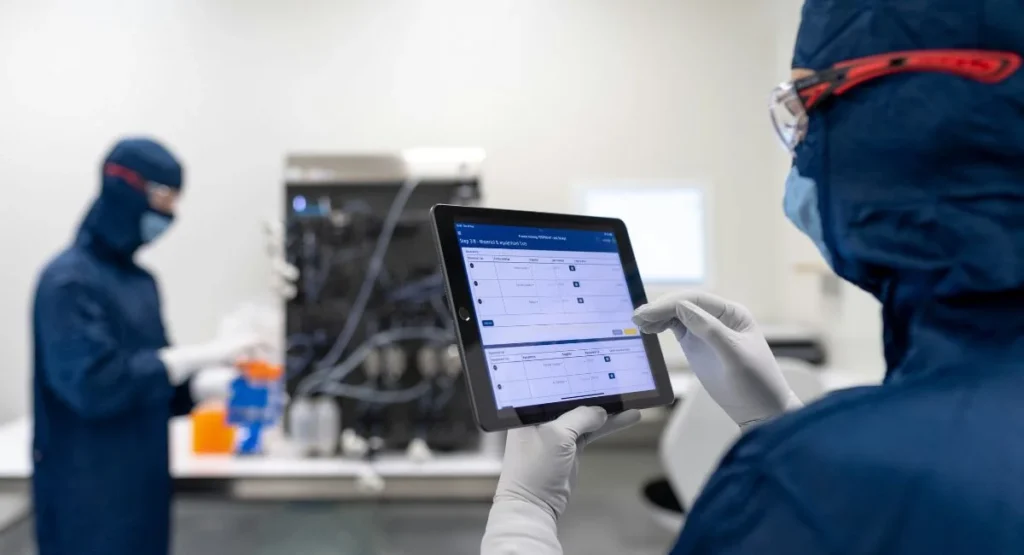Are You Concerned About Medical Errors in Healthcare?Medical errors are a leading cause of harm to patients worldwide. Whether it’s an incorrect diagnosis, a miscommunication between healthcare providers, or a medication mix-up, these errors can have serious consequences. According to the World Health Organization (WHO), medical errors are responsible for millions of deaths and disabilities each year, making it one of the biggest concerns in healthcare today.
But how can healthcare systems tackle this growing problem? AI-powered healthcare software is emerging as a solution to reduce medical errors by leveraging technology to improve accuracy, efficiency, and decision-making. In this blog, we will explore how AI healthcare software is revolutionizing patient careand significantly reducing medical errors.
What is AI Healthcare Software, and How Does It Work?
AI healthcare software refers to the integration of artificial intelligence (AI) technologies into healthcare systems to assist in various processes, such as diagnosis, treatment planning, medication management, and patient monitoring. The software uses machine learning algorithms and data analytics to process vast amounts of medical data, helping healthcare providers make more accurate decisions.
AI healthcare software works by analyzing patterns in data, detecting anomalies, and providing real-time recommendations. For example, an AI algorithm could analyze patient medical histories and lab results to identify early warning signs of a medical condition that a human doctor might overlook. This advanced technology enables healthcare professionals to provide personalized, accurate care, all while reducing human error.
How Can AI Healthcare Software Help Prevent Diagnostic Errors?
Why is diagnostic error a significant problem in healthcare?
Diagnostic errors are one of the most common types of medical mistakes, affecting millions of patients each year. Misdiagnosis can occur for a variety of reasons, including incorrect patient information, overlooked symptoms, and cognitive biases in decision-making. Unfortunately, these errors can lead to delayed treatment, unnecessary procedures, or improper care.
How does AI healthcare software help reduce diagnostic errors?
AI healthcare software helps reduce diagnostic errors by assisting healthcare professionals in analyzing complex patient data and identifying patterns that may not be immediately apparent. Here’s how it works:
- Data-Driven Decision-Making: AI algorithms can analyze patient data, including medical history, lab results, imaging scans, and genetic information, to assist doctors in making more informed decisions. For example, AI can analyze medical imaging data, such as X-rays or MRIs, to detect early signs of diseases like cancer or pneumonia that might go unnoticed by human eyes.
- Predictive Analytics: AI-powered systems use predictive analytics to help healthcare providers assess the likelihood of certain conditions based on patient data. This proactive approach can alert doctors to high-risk patients and help prevent misdiagnosis before it happens.
- Clinical Decision Support Systems (CDSS): AI-based clinical decision support tools provide real-time, evidence-based recommendations to clinicians. These systems can suggest potential diagnoses, highlight possible drug interactions, and recommend treatment plans, thus ensuring that the healthcare provider considers all possible factors before making a decision.
- Pattern Recognition: AI can analyze patient data to identify patterns that may signal specific diseases or conditions. This technology can spot rare or atypical presentations of common diseases, helping healthcare professionals make more accurate diagnoses and avoid overlooking critical details.
How Can AI-Powered Software Improve Medication Safety and Prevent Errors?
Medication errors are another significant source of harm in healthcare. These can occur at any stage of the medication process, from prescribing and dispensing to administering and monitoring patient responses. Mistakes in medication can result in adverse drug reactions, incorrect dosages, or drug interactions that cause harm to patients.
How does AI healthcare software enhance medication safety?
AI healthcare software plays a vital role in ensuring medication safety by streamlining the prescription, dispensing, and administration processes. Here’s how AI contributes to reducing medication errors:
Automated Prescription Management: AI-powered prescription management systems help healthcare providers generate accurate prescriptions by checking for common errors such as incorrect dosages, drug interactions, or allergies. These systems cross-reference medications with patient histories, reducing the likelihood of human error during prescription writing.
- Drug Interaction Alerts: AI algorithms can analyze patient data to identify potential drug interactions. By alerting healthcare providers to possible interactions, these systems help prevent adverse reactions caused by combining medications that shouldn’t be taken together.
- Real-Time Monitoring: AI systems can monitor patients in real-time after administering medication to track vital signs, lab results, and other health metrics. If a medication leads to an adverse reaction, AI systems can flag the issue early, allowing for prompt intervention and reducing the risk of harm.
- Medication Adherence Support: AI-powered apps can remind patients to take their medications on time, improving patient adherence to prescribed treatments. These tools can also track whether patients are taking medications as prescribed, helping healthcare providers intervene if needed.
- AI-Driven Dosage Calculations: AI healthcare software can calculate the correct dosage for patients based on variables such as age, weight, medical condition, and kidney function. This reduces the risk of underdosing or overdosing, ensuring that patients receive the appropriate medication levels.
How Does AI Healthcare Software Enhance Communication and Collaboration Among Healthcare Providers?
Why is communication between healthcare providers crucial in preventing medical errors?
Inadequate communication between healthcare providers, such as doctors, nurses, and specialists, is a leading cause of medical errors. Miscommunication can result in inconsistent treatment plans, missed diagnoses, or conflicting medication prescriptions.

How can AI improve communication and collaboration in healthcare?
AI healthcare software enhances communication by streamlining the flow of information between healthcare providers, ensuring that critical data is shared accurately and in real-time. Here’s how AI improves collaboration:
- Centralized Patient Records: AI healthcare software integrates patient records into a single, digital platform that can be accessed by all members of the healthcare team. This centralized system ensures that every provider is on the same page regarding patient care, reducing the risk of missed information or conflicting treatment plans.
- Real-Time Data Sharing: AI-powered systems enable healthcare providers to share patient data and updates in real time. This helps ensure that all relevant information is available when making decisions, improving the coordination of care and reducing the likelihood of errors caused by incomplete or outdated data.
- Automated Task Management: AI software can automatically assign tasks and send reminders to healthcare providers, ensuring that important actions are taken on time. For example, AI can prompt a nurse to follow up on a lab result or alert a doctor to check on a high-risk patient. This reduces the chances of delays or oversights in patient care.
- Natural Language Processing (NLP): AI software that uses natural language processing (NLP) can analyze and interpret clinical notes, making it easier for healthcare providers to extract relevant information from unstructured data. This helps improve the accuracy and completeness of patient records and facilitates better decision-making.
How Does AI Healthcare Software Contribute to Patient Safety and Quality of Care?
Why is patient safety such a priority in healthcare?
Patient safety is at the core of high-quality care. Medical errors can have serious, sometimes fatal, consequences, making it essential for healthcare providers to implement systems that prioritize patient safety. How does AI contribute to improving patient safety?
AI healthcare software enhances patient safety by offering proactive solutions to reduce errors, improve care coordination, and ensure that patients receive the right treatment at the right time. Here’s how AI-powered software improves patient safety and quality of care:
- Predictive Analytics for High-Risk Patients: AI can analyze patient data to identify high-risk patients who may need closer monitoring or more frequent interventions. By flagging these patients early, AI helps providers intervene before problems arise, reducing the likelihood of complications.
- Personalized Treatment Plans: AI can analyze data to create personalized treatment plans tailored to individual patients. This ensures that patients receive the most effective care based on their unique health profiles, reducing the risk of errors associated with generalized treatment approaches.
- Continuous Monitoring and Alerts: AI-powered systems continuously monitor patient data, providing real-time alerts if any changes in vital signs or other health indicators suggest a potential issue. This continuous monitoring helps healthcare providers address problems before they escalate, improving overall patient outcomes.
- Evidence-Based Recommendations: AI algorithms use evidence-based guidelines to provide healthcare providers with treatment recommendations. This ensures that decisions are grounded in the latest research and clinical evidence, reducing the chances of outdated or incorrect treatment plans.
Conclusion: AI Healthcare Software is the Future of Medical Error Reduction
AI healthcare software is transforming the healthcare landscape by reducing medical errors and improving patient outcomes. From assisting in accurate diagnoses and preventing medication errors to enhancing communication between healthcare providers, AI is playing a pivotal role in making healthcare safer, more efficient, and more effective.
As AI technology continues to evolve, its potential to improve patient care and reduce errors will only increase. By adopting AI healthcare software, healthcare organizations can improve clinical decision-making, streamline workflows, and provide higher-quality care to their patients. The future of healthcare is smart, and AI-powered software is leading the way.
Ready to Upgrade Your Clinic?
Make your clinic smart, fast, and paperless with SehatPro Clinic Management Software.
Call or WhatsApp for Free Demo & ConsultationFAQs
1. What is AI healthcare software?
AI healthcare software refers to digital systems that use artificial intelligence to improve various aspects of healthcare, including diagnosis, treatment, medication management, and patient monitoring.
2. How does AI reduce medical errors?
AI reduces medical errors by providing real-time, data-driven insights, automating repetitive tasks, and assisting healthcare providers in making more accurate and informed decisions.
3. Can AI help with medication safety?
Yes, AI healthcare software can reduce medication errors by automating prescription management, providing drug interaction alerts, and offering real-time monitoring to detect adverse reactions.
4. How does AI improve communication between healthcare providers?
AI improves communication by centralizing patient data, enabling real-time data sharing, and automating task management, ensuring that healthcare providers have accurate and timely information.
5. How does AI contribute to patient safety?
AI enhances patient safety by using predictive analytics to identify high-risk patients, providing evidence-based treatment recommendations, and continuously monitoring patient data to prevent complications.




